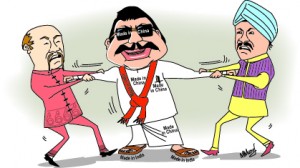Forget CEPA: Focus on Indo-Lanka FTA
Amidst continuing opposition from professionals and businessmen to the Comprehensive Economic Partnership Agreement (CEPA) with India, the Sri Lankan government is now shifting gears to strengthening the Indo-Lanka Free Trade Agreement (FTA), a top government official said.
With current bilateral trade worth US $ 4.8 billion heavily in favour of India, the government is exploring the possibility of increasing its exports taking advantage of the FTA, he said, adding that the CEPA finalisation process is not a priority at the moment. Apprehensions in Sri Lanka on opening the services sector to Indians have deferred the finalization of CEPA, he said. In a separate move, heeding to concerns expressed by the medical profession, the government has excluded medical and dental services from the offer list to India under the proposed CEPA. Negotiations for CEPA were started in February 2005 and concluded in July 2008, after 13 difficult rounds. However, the agreement could not be signed then owing to some reservations expressed by Sri Lankan government. In recent weeks, there has a renewal of the CEPA initiative amidst vague comments by government ministers including Media Minister Keheliya Rambukwella who has been at pains to explain to the media recently that CEPA is still alive. The Department of Commerce has told the Sri Lanka Medical Association (SLMA) that medical and dental services as well as health related and social services have not been included in the CEPA and the SAARC Agreement on Trade in Sri Lanka (SATISL), which was a part of the CEPA.
This assurance was given by the department in response to a request made by the medical association to remove medical and dental services from the offer list of CEPA /SATISL, Prof. Vajira H. W. Dissanayake, SLMA President told the Business Times. He revealed that following serious discussion with members of the SLMA it was the unanimous views of all present that taking into consideration the current regulatory environment in the country it would not be prudent to embark on liberalising the medical and health services at the present time. This view was upheld at a Council Meeting of the SLMA held on September 9.
Commerce Department sources said the government is unlikely to sign the CEPA even amidst India’s insistence to conclude it hurriedly as the framework of the accord is still in the discussion stage,
The SATISL is also not finalized. Sri Lanka has not even started preparing the initial conditional offer list under SATISL and the opening of the service sector would be done after consultation with local stake holders, he said.
DSI Group Managing Director Kulatunga Rajapakse said the danger of CEPA was mainly due to India’s emphasis on the liberalization of the service sector and with SATISL if Sri Lanka does not strive hard to keep the service sector intact through the regulations, there is a strong chance that Sri Lanka could get swamped by powerful Indian companies that are well linked to the global system and research bases. He noted that there is no such thing as equitable benefits for Sri Lanka where India is concerned..it would be benefits to India and Indians alone. “CEPA was never taken up for discussions with the CEO delegation from India and the whole idea of the recently concluded forum was to double the trade while reducing the imbalance in trade gap between two countries”, he said.
Did Sri Lankan officials even think as to how to tackle Indian arrivals or at least monitor them when Indians were given the visa to Sri Lanka on entry, he asked. He said that sooner than later there would be more Indians than Sri Lankans in Sri Lanka? Did India even reciprocate this gesture? He noted that if CEPA is approved, Sri Lanka would be flooded with Indian labour in all spheres of work – professional, skilled, semi-skilled and unskilled because of India’s heavy unemployment. How can Sri Lankans be assured of employment in India when 327 million non-graduate Indians are unemployed and 4.8 million graduates are unemployed? M. P. Wickremasinghe, Chairman, Ceylon Biscuits Ltd told the Business Times that President Mahinda Rajapaksa has assured that CEPA will not be signed as it is not beneficial for the country.
Director Multichemi Group Samantha Kumarasinghe, who is a spokesman of the anti-CEPA group, said that the CEPA is bound to cause serious harm to Sri Lanka. According to him the Indian authorities have consulted around 1000 Indian economists on CEPA. But in Sri Lanka’s case it was the opposite, he alleged.
He noted that not a single businessman professional or entrepreneur in Sri Lanka has been consulted.
Follow @timesonlinelk






















